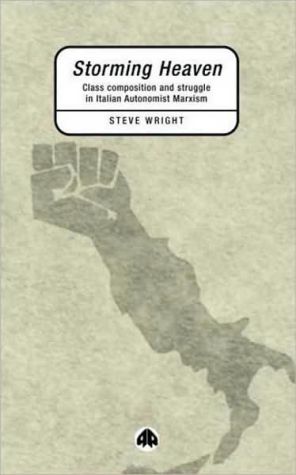

 |

|

The average rating for Storming heaven based on 2 reviews is 4 stars.
Review # 1 was written on 2018-01-02 00:00:00 Natalia Hornsey Natalia HornseyBuilt from Wright's dissertation and the academic contempt for readability is here, making it all rather sluggish. Thankfully, it's packed with theoretical clarity and good judgement -- a solid bit of intellectual history. (If you're looking to understand the workerist current politically, it's a lot less useful and remains difficult to piece together here I found -- Wright is more invested in the theoretical trajectories and considering the lack of translations, nothing wrong with that). |
Review # 2 was written on 2018-02-16 00:00:00 Dean McIlvaine Dean McIlvaineA solid intellectual/social history of the Italian strand of post-WW2 Marxism known as 'workerism', or operaismo - as well as related 'post-operaist' groups - up until the late 1970s. Worth reading if you are curious about the origins of many contemporary arguments made by the milieu of (post)Autonomist theorists and activists, regarding: class (re)composition; the 'social' or 'immaterial' worker; and the centrality of 'the wage' as an analytical and political category. Operaismo originated in the writings of Raniero Panzieri, a dissident PSI (Italian Socialist Party) intellectual dissatisfied with the main reformists trends in the Stalinist PCI and his own party, and who sought to rejuvenate Italian revolutionary Marxism through an engagement with the lived reality of the 'mass worker': the new generation of young proletarians transplanted from the Mezzogiorno to the factories and cities of the north, and the novel methods of class struggle they forged there in the face of the rigidity of the mainstream labour movement. Contributing to the elaboration of 'operaismo' as a distinct theoretical and analytical strand - above all through a novel reading of Volume 1 of Capital (and later, the Grundrisse) that sought to 'subjectify' Marx's categories in terms of working class resistance; and an empirical analysis of the new large factories that relied on the method of the "worker's inquiry" which involved workers and researchers in a cooperative investigative project - were key figures such as Mario Tronti, Romano Alquati, Toni Negri, along with an entire wave of leftist intellectuals and activists drawn to the workerists' critique of the typically idealist and dogmatic Marxism of the PCI (and Italian Trotskyism). Alongside this political and theoretical work, an innovative school of workerist historiography was launched, which Wright covers in a useful chapter. As the 'mass worker' became the catalyst of a series of vicious class struggles in Italy through the late '60s - culminating in the large-scale strikes of the 'Hot Autumn' or Autunno Caldo of 1969/70 - the arguments of the workerists appeared to be bearing fruit, in particular their insistence that resistance to capitalist labour regimes (and the demand for better pay) in the factories was itself a 'political' and not merely 'economic' act as the vulgar-Gramscians of the PCI had suggested. As this wave of working class 'autonomous' activity (alongside the explosion of student activism in 1968/69) crested and receded over the early 70s, however - and its networks of rank-and-file militants were marginalised or re-incorporated into the traditional union structures - the workerists reached something of a dead-end politically and theoretically. Its various formal organisations - Potere Operaio, Lotta Continua, and the nascent Autonomist sub-cultures in large working-class cities - entered into stagnation, crisis, and eventual disbandment over the course of the '70s, while former theorists of workerism like Toni Negri in the face of these defeats proceeded to adopt an almost totally-dematerialised conception of politics (laying the grounds for his eventual incorporation of and into the swamp of post-structuralist French radical-academic Theory). Tendentiously linked to the Moro kidnapping/murder carried out by the terrorist group Brigate Rosse (Red Brigades) in 1978, the leading cadres of Autonomism were arrested en masse and subjected to various show trials on trumped-up charges over the following period - the final death knell for the movement as a national force. This narrative history is interesting and comprehensive, though I feel at times there is a lack of clear criticism (outside of the author's straightforward critique of the semi-deranged Negri) of certain aspects of workerist theory. The ones that I would state plainly are: 1) Tronti's one-sided misreading of Volume 1, which valorises worker resistance over inter-capitalist competition as the mechanism for the increase of relative vs absolute surplus value in production; 2) an Italian provinicalism/parochialism that tended to read a whole series of universal changes in the post-WWII capitalist economic and political order as the product of some unique Italian sonderweg; 3) the lack of a clear theorisation of capitalist crisis, the limits of Keynesianism, and the complex link between ideas and materiality (or, crisis and revolution) - with workerists and post-workerists tending almost universally to short-circuit this chain in one direction or another. A lot of this could have been solved by a serious engagement with renovations of Marxism being carried out by dissident Marxian traditions outside of Italy (including Trotskyists!) during this period. The book's real charm however lies in its afterword*, written for the new edition by two contemporary Italian academics who draw inspiration from classical operaismo. It comprehensively dismantles various intellectual distortions its categories have been subjected to by Negri in his 'post-autonomist' (more accurately, post-Marxist) phase of writings, much of which were highly influential within the 'alter-globalisation' movement of the late 90s and early 2000s. They also conclude with some helpful musings on what remains valid in the original inspiration and analytic tools pioneered by Italian operaismo. * available in full here: |
CAN'T FIND WHAT YOU'RE LOOKING FOR? CLICK HERE!!!